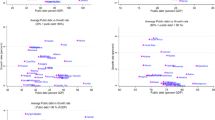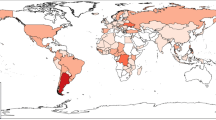Abstract
In this study, we investigate the financial and monetary policy responses to oil price shocks using a Structural VAR framework. We distinguish between net oil-importing and net oil-exporting countries. Since the 80s, a significant number of empirical studies have been published investigating the effect of oil prices on macroeconomic and financial variables. Most of these studies though, do not make a distinction between oil-importing and oil-exporting economies. Overall, our results indicate that the level of inflation in both net oil-exporting and net oil-importing countries is significantly affected by oil price innovations. Furthermore, we find that the response of interest rates to an oil price shock depends heavily on the monetary policy regime of each country. Finally, stock markets operating in net oil-importing countries exhibit a negative response to increased oil prices. The reverse is true for the stock market of the net oil-exporting countries. We find evidence that the magnitude of stock market responses to oil price shocks is higher for the newly established and/or less liquid stock markets.







Similar content being viewed by others
Notes
The UK is classified as a net oil importer based on its current status. We need to consider though, that for most part of the sample period the country was a net oil-exporter. This draws a distinction between the UK and the remaining six net oil-importing countries of the sample. We further consider this distinction in the analysis of the empirical findings. .
Results can be obtained upon request.
Ibid.
We do not consider any available data prior to 1996, as during this time Russia was in a transition period, which was characterised by a volatile behaviour of the variables under consideration. This is in line with Granville and Mallick (2010).
Data availability issues have imposed constraints to our sample period.
Exchange rates were collected from Pacific Exchange Rate Service.
The actual VAR(6) coefficient tables are available upon request.
References
Abel AB, Bernanke BS (2001) Macroeconomics. Addison Wesley Longman Inc., New York
Al-Fayoumi AN (2009) Oil prices and stock market returns in oil importing countries: the case of Turkey, Tunisia and Jordan. Eur J Econ Financ Adm Sci 16:86–101
Apergis N, Miller S (2009) Do structural oil-market shocks affect stock prices? Energ Econ 31:569–575
Arouri MEH, Nguyen DK (2010) Oil prices, stock markets and portfolio investment: evidence from sector analysis in Europe over the last decade. Energ Econ 31:569–575
Arouri MEH, Rault C (2012) Oil prices and stock markets in GCC countries: empirical evidence from panel analysis. Int J Financ Econ 17(3):242–253
Bachmeier L (2008) Monetary policy and the transmission of oil shocks. J Macroecon 30:1738–1755
Barro RJ (1984) Macroeconomics. Wiley, New York
Barsky RB, Kilian L (2004) Oil and the macroeconomy since the 1970s. J Econ Perspect 18:115–134
Bashar AZ (2006) Wild oil prices, but brave stock markets! The case of GCC stock markets. Oper Res 6:145–162
Bernanke BS, Gertler M, Watson M (1997) Systematic monetary policy and the effects of oil price shocks. Brookings Pap Econ Act 1:91–148
Bharn R, Nikolovann B (2010) Global oil prices, oil industry and equity returns: Russian experience. Scott J Polit Econ 57:169–186
Bjornland HC (2009) Oil price shocks and stock market booms in an oil exporting country. Scott J Polit Econ 2:232–254
Bjornland HC, Leitemo K (2009) Identifying the interdependence between US monetary policy and the stock market. J Monetary Econ 56:275–282
Blanchard O, Gali J (2007) The macroeconomic effects of oil price shocks. Why are the 2000s so different than the 1970s? National Bureau of Economic Research, Working Paper 13368
Bohi DR (1989) Energy price shocks and macroeconomic performance. Resources for the Future, Washington, D.C.
Burbridge J, Harrison A (1984) Testing for the effects of oil price rises using vector autoregressions. Int Econ Rev 25:459–484
Castillo P, Montoro C, Tuesta V (2010) Inflation, oil price volatility and monetary policy. Banco Central de Reserva del Perú, Working Papers 2010-002
Central Bank of Russia (2010) Guidelines for the single state monetary policy in 2010 and for 2011 and 2012. http://www.cbr.ru/eng/today/publications_reports/on_10-eng.pdf. Accessed by 11/12/2012
Chen SS (2010) Do higher oil prices push the stock market into bear territory? Energ Econ 32:490–495
Chen NF, Roll R, Ross S (1986) Economic forces and the stock market. J Bus 59:383–403
Ciner C (2001) Energy shocks and financial markets: nonlinear linkages. Stud Nonlinear Dyn E 5:203–212
Clarida R, Gali J, Gertler M (2000) Monetary policy rules and macroeconomic stability: evidence and some theory. Q J Econ 115:147–180
Cologni A, Manera M (2008) Oil prices, inflation and interest rates in a structural co-integrated VAR model for the G-7 countries. Energ Econ 30:856–888
Cong RG, Wei YM, Jiao JL, Fan Y (2008) Relationships between oil price shocks and stock market: an empirical analysis from China. Energ Policy 36:3544–3553
Cunado J, Perez de Gracia F (2005) Oil prices, economic activity and inflation: evidence for some Asian countries. Q Rev Econ Financ 45:65–83
DeLong JB (1997) America’s peacetime inflation: the 1970s. In: Romer C, Romer D (eds) Reducing inflation: motivation and strategy. Chicago University Press, Chicago
Driesprong G, Jacobsen B, Maat B (2008) Striking oil: another puzzle? J Financ Econ 89:307–327
Du L, He Y, Wei C (2010) The relationship between oil price shocks and China’s macro-economy: an empirical analysis. Energ Policy 38:4142–4151
Elwood SK (2001) Oil-price shocks: beyond standard aggregate demand/aggregate supply analysis. J Econ Educ 32:381–386
Ferderer PJ (1996) Oil price volatility and the macroeconomy. J Macroecon 18:1–26
Filis G (2010) Macro economy, stock market and oil prices: do meaningful relationships exist among their cyclical fluctuations? Energ Econ 32:877–886
Filis G, Degiannakis S, Floros C (2011) Dynamic correlation between stock market and oil prices: the case of oil-importing and oil-exporting countries. Int Rev Financ Anal 20(3):152–164
Flannery MJ, Protopapadakis A (2002) Macroeconomic factors do influence aggregate stock returns. Rev Financ Stud 15:751–781
Gisser M, Goodwin TH (1986) Crude oil and the macroeconomy: tests of some popular notions. J Money Credit Bank 18:98–103
Gjerde Ø, Sættem F (1999) Causal relations among stock returns and macroeconomic variables in a small, open Economy. J Int Financ Mark Inst Money 9:61–74
Granville BE, Mallick S (2006) Does inflation or currency depreciation drive monetary policy in Russia? Res Int Bus Financ 20:163–179
Granville BE, Mallick S (2010) Monetary policy in Russia: identifying exchange rate shocks. Econ Model 27(1):432–444
Hamilton JD (1983) Oil and the macroeconomy since World War II. J Polit Econ 9:228–248
Hamilton JD (1988) Are the macroeconomic effects of oil-price changes symmetric? A comment. Carn Roch Conf Ser 28:369–378
Hamilton JD (1996) This is what happened to the oil price-macroeconomy relationship. J Monetary Econ 38:215–220
Hamilton JD (2008) Understanding crude oil prices. National Bureau of Economic Research, Working Paper 14492
Hamilton JD (2009a) Understanding crude oil prices. Energ J 30:179–206
Hamilton JD (2009b) Causes and consequences of the oil shock of 2007–08. Brookings Pap Econ Act Spring:215–261
Hamilton JD, Herrera AM (2004) Oil shocks and aggregate macroeconomic behavior: the role of monetary policy. J Money Credit Bank 36:265–286
Haung RD, Masulis RW, Stoll HR (1996) Energy shocks and financial markets. J Futur Mark 16:1–27
Hooker MA (2002) Are oil shocks inflationary? Asymmetric and nonlinear specifications versus changes in regime. J Money Credit Bank 34:540–561
International Energy Agency (2006) World energy outlook
Jammazi R, Aloui C (2010) Wavelet decomposition and regime shifts: assessing the effects of crude oil shocks on stock market returns. Energ Policy 38:1415–1435
Jimenez-Rodriguez R (2009) Oil price shocks and real GDP growth: testing for non-linearity. Energy J 30:1–24
Jimenez-Rodriguez R, Sanchez M (2005) Oil price shocks and real GDP growth: empirical evidence for some OECD countries. European Central Bank, Working Paper No 362
Jones CM, Kaul G (1996) Oil and stock markets. J Financ 51:463–491
Jones DW, Lelby PN, Paik IK (2004) Oil price shocks and the macroeconomy: what has been learned since 1996. Energy J 25:1–32
Kaul G, Seyhun HS (1990) Relative price variability, real shocks and the stocks market. J Financ 45:479–496
Kilian L (2009) Not all oil price shocks are alike: disentangling demand and supply shocks in the crude oil market. Am Econ Rev 99:1053–1069
Kilian L, Park C (2009) The impact of oil price shocks on the U.S. stock market. Int Econ Rev 50:1267–1287
Korhonen I, Ledyaeva S (2010) Trade linkages and macroeconomic effects of the price of oil. Energ Econ 32:848–856
Laopodis N (2010) Dynamic linkages between monetary policy and the stock market. Rev Quant Financ Account 35:271–293
LeBlanc M, Chinn MD (2004) Do high oil prices presage inflation? The evidence from G5 countries. Bus Econ 34:38–48
Lee YH, Chiou JS (2011) Oil sensitivity and its asymmetric impact on the stock market. Energy 36:168–174
Lescaroux F, Mignon V (2009) On the influence of oil prices on economic activity and other macroeconomic and financial variables. OPEC Energy Rev 32(4):343–380
Maghyereh A (2004) Oil price shocks and emerging stock markets. A generalized VAR approach. Int J Appl Econ Quant Stud 1:27–40
Malik F, Ewing B (2009) Volatility transmission between oil prices and equity sector returns. Int Rev Financ Anal 18:95–100
Malliaris AG, Malliaris M (2011) Are oil, gold and the euro inter-related? Time series and neural network analysis. Rev Quant Financ Account 40:1–14
Mendoza O, Vera D (2010) The asymmetric effects of oil shocks on an oil-exporting economy. Cuadernos de Economia 47:3–13
Miller IJ, Ratti RA (2009) Crude oil and stock markets: stability, instability, and bubbles. Energ Econ 31:559–568
Mohanty SK, Nandha M (2011) Oil shocks and equity returns: an empirical analysis of the US transportation sector. Rev Pac Financ Mark Policies 14(1):101–128
Mohanty SK, Nandha M, Turkistani AQ, Alaitani MY (2011) Oil price movements and stock market returns: evidence from Gulf Cooperation Council (GCC) countries. Glob Financ J 22(1):42–55
Mohanty SK, Akhigbe A, Al-Khyal TA, Bugshan T (2012) Oil and stock market activity when prices go up and down: the case of the oil and gas industry. Rev Quant Financ Account. doi:10.1007/s11156-012-0309-9
Nandha M, Brooks R (2009) Oil prices and transport sector returns: an international analysis. Rev Quant Financ Account 33:393–409
Nandha M, Faff R (2008) Does oil move equity prices? A global view. Energ Econ 30:986–997
Oberndorfer U (2009) Energy prices, volatility, and the stock market: evidence from the Eurozone. Energ Policy 37:5787–5795
O’Neill TJ, Penm J, Terrell RD (2008) The role of higher oil prices: a case of major developed countries. Res Finance 24:287–299
Papapetrou E (2001) Oil price shocks, stock market, economic activity and employment in Greece. Energ Econ 23:511–532
Park J, Ratti RA (2008) Oil prices and stock markets in the U.S. and 13 European countries. Energ Econ 30:2587–2608
Romer CD, Romer DH (1989) Does monetary policy matter? A new test in the spirit of Friedman and Schwartz. University of California at Berkeley Economics, Working Papers 89–107
Sadorsky P (1999) Oil price shocks and stock market activity. Energ Econ 21:449–469
Siklos P, Kwok B (1999) Stock returns and inflation: a new test of competing hypotheses. Appl Financ Econ 9:567–581
Tang W, Wu L, Zhang ZX (2010) Oil price shocks and their short- and long-term effects on the Chinese economy. Energ Econ 32:S3–S14
Terzian P (1985) OPEC the insider story. Zed Books, London
Acknowledgments
The authors would like to thank the Editor, Professor Cheng-Few Lee, and the anonymous reviewers for their insightful comments and suggestions on a previous version of this paper. The usual disclaimer applies.
Author information
Authors and Affiliations
Corresponding author
Rights and permissions
About this article
Cite this article
Filis, G., Chatziantoniou, I. Financial and monetary policy responses to oil price shocks: evidence from oil-importing and oil-exporting countries. Rev Quant Finan Acc 42, 709–729 (2014). https://doi.org/10.1007/s11156-013-0359-7
Published:
Issue Date:
DOI: https://doi.org/10.1007/s11156-013-0359-7




